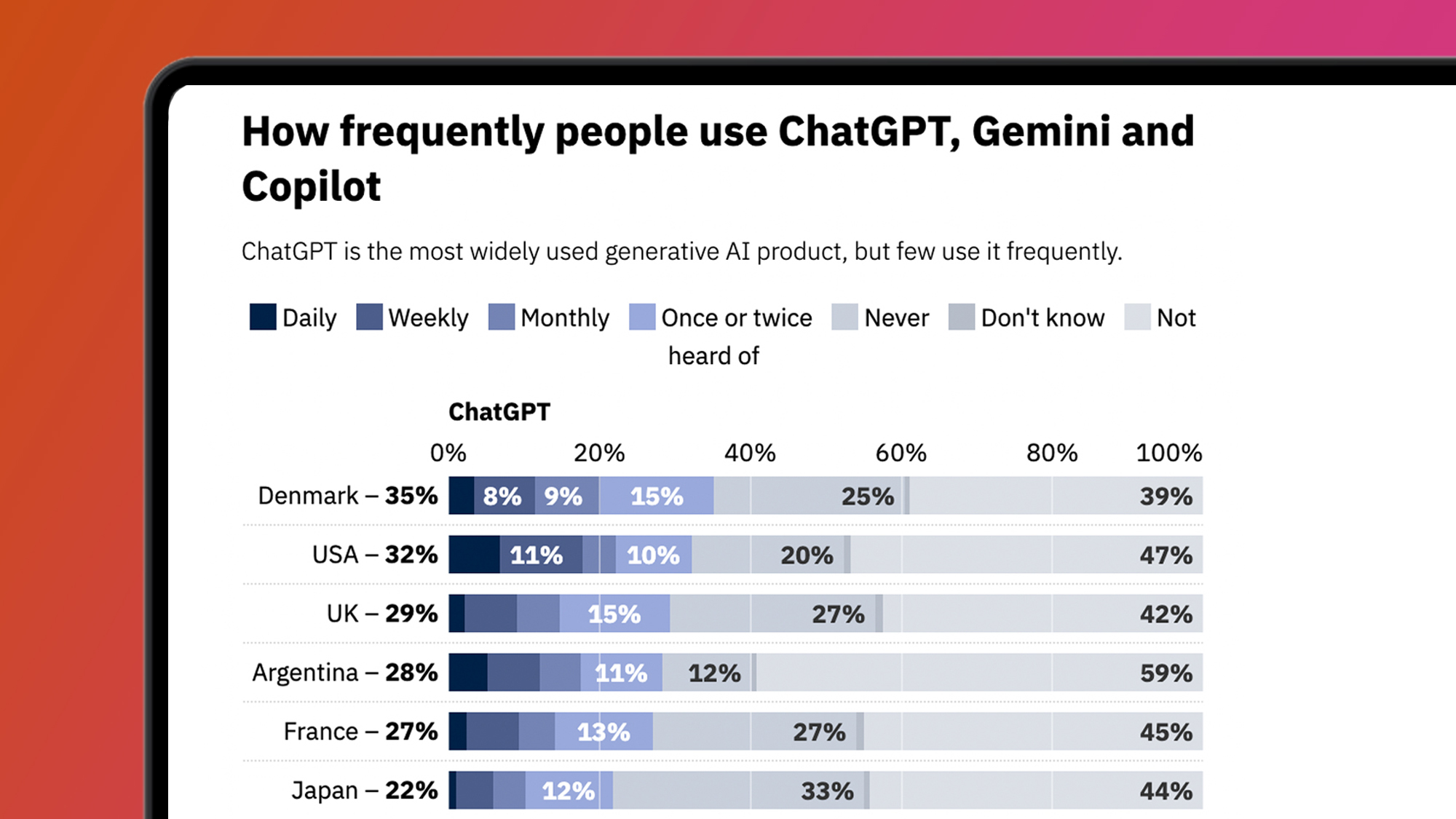Hardly any of us are using AI tools like ChatGPT, study says – here’s why

If you’re feeling a bit overwhelmed or left behind by ChatGPT and other AI tools, fear not – a big new international study has found that most of us aren’t using generative AI tools on a regular basis.
The study from Reuters Institute and Oxford University (via BBC), which surveyed over 12,000 people across six countries, seemingly reveals how little that AI hype has percolated down to real-world use, for now.
Even among the people who have used generative AI tools like ChatGPT, Google Gemini or Microsoft Copilot, a large proportion said they’d only used them “once or twice”. Only a tiny minority (7% in the US, 2% in the UK) said they use the most well-known AI tool, ChatGPT, on a daily basis.
A significant proportion of respondents in all countries (including 47% in the US, and 42% in the UK) hadn’t even heard of ChatGPT, a figure that was much higher for other AI apps. But after ChatGPT, the most recognized tools were Google Gemini, Microsoft Copilot, Snapchat My AI, Meta AI, Bing AI and YouChat.
Trailing further behind those in terms of recognition were generative AI imagery tools like Midjourney, plus Claude and the xAI’s Grok for X (formerly Twitter). But while the regular use of generative AI tools is low, the survey does provide some interesting insights on what the early dabblers are using them for.
Broadly speaking, the use cases were split into two categories; “creating media” and, more worryingly given the issue of AI hallucinations, “getting information”. In the former, the most popular answer was simply “playing around or experimenting” (11%), followed by “writing an email or letter” (9%) and “making an image” (9%).
The top two answers in the ‘getting information’ category were “answering factual questions” (11%) and “asking advice” (10%), both of which were hopefully followed by some corroboration from other sources. Most AI chatbots still come with prominent warnings about their propensity for making mistakes – for example, Google says Gemini “could provide inaccurate information or could even make offensive statements”.
AI tools are arguably better for brainstorming and summarizing, and these were the next most popular uses cases in the survey – with “generating ideas” mentioned by 9% of respondents and “summarizing text” cited by 8% of people.
But while the average person is still seemingly at the dabbling stage with generative AI tools, most people in the survey are convinced that the tools will ultimately have a big impact on our daily lives. When asked if they thought that “generative AI will have a large impact on ordinary people in the next five years”, 60% of 18-24 year olds thought it would, with that figure only dropping to 41% among those who were 55 and older.

All surveys have their limitations, and this one focuses mostly on standalone generative AI tools rather than examples of the technology that’s baked into existing products – which means that AI is likely more widely used than the study suggests.
Still, its broad sample size and geographic breadth does give us an interesting snapshot of how the average person views and uses the likes of ChatGPT. The answer is that it remains very niche among consumers, with the report’s lead author Dr Richard Fletcher suggesting to the BBC that it shows there’s a “mismatch” between the “hype” around AI and the “public interest” in it.
Why might that be the case? The reality is that most AI tools, including ChatGPT, haven’t yet convinced us that they’re frictionless or reliable enough to become a default part of our tech lives. This is why the focus of OpenAI‘s new GPT-4o model (branding being another issue) was a new lifelike voice assistant, which was designed to help lure us into using it more regularly.
Still, while even tech enthusiasts still have reservations about AI tools, this appears to be largely irrelevant to tech giants. We’re now seeing generative AI being baked into consumer products on a daily basis, from Google Search’s new AI summaries to Microsoft’s Copilot coming to our messaging apps to iOS 18’s rumored AI features for iPhones.
So while this survey’s respondents were “generally optimistic about the use of generative AI in science and healthcare, but more wary about it being used in news and journalism, and worried about the effect it might have on job security”, according to Dr Fletcher, it seems that AI tech is going to become a daily part of our lives regardless – just not quite yet.



